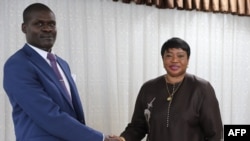The International Criminal Court’s prosecutor Fatou Bensouda is in Khartoum, trying to persuade the transitional government to hand over former Sudanese President Omar al-Bashir and other former top officials wanted for war crimes and genocide in Darfur.
Bensouda is also seeking Sudan’s cooperation in prosecuting Sudanese military commander Ali Kushayb, who surrendered to the ICC in June and is expected to go on trial in the Hague.
Bensouda arrived in Khartoum to meet with Sudanese officials late Saturday. It is the first announced visit by Bensouda and other ICC officials to Sudan since the court began working on charges against former Sudanese officials.
“Our main purpose for coming here is to seek cooperation with current authorities of the Sudan, to discuss the case that already is about to start and also to seek cooperation with respect to the rest of the arrest warrants that have been issued in the situation in Darfur, Sudan,” she said.
In 2009 and 2010, the ICC issued two arrest warrants for then-President Bashir on multiple counts of genocide, war crimes and crimes against humanity committed in Darfur between 2003 and 2008 during a counterinsurgency campaign by his government. Other arrest warrants were issued for three top political and military officials in the Bashir administration and a rebel commander from Darfur.
In June, the commander of pro-Bashir Janjaweed militia in Darfur, Ali Kushayb, surrendered to authorities in the Central African Republic and was transferred to the Hague to stand trial on 50 counts of war crimes and crimes against humanity committed in Darfur.
Bashir is in a Khartoum prison after being found guilty on corruption charges.
Two other top figures in Bashir’s administration, Abdel-Rahim Muhammad Hussein, interior and defense minister for many years, and Ahmed Haroun, a senior security chief, have been under arrest since the Sudanese military ousted Bashir in April 2019 after months of mass protests.
Abdallah Banda, a rebel leader from Darfur who was also indicted by the ICC, remains at large.
An opportunity for justice
Bashir’s ouster last year brought an opportunity to achieve justice for the thousands of victims of war crimes in Darfur, according to Salih Mahmoud, president of the Darfur Bar Association.
“After the revolution of December, hopes of victims revived because they thought in the absence of Bashir, the transitional government should be more understanding of the importance of justice and fighting impunity because all the perpetrators who are implicated in the commission of horrible crimes in Darfur are still beyond the reach of justice; on their head is Omar al-Bashir and the other individuals,” Mahmoud told VOA’s South Sudan in Focus.
The transitional government must be true to its word and cooperate fully with the ICC, which includes turning over Bashir and his former top officials to the international court, Mahmoud said.
“The victims are waiting to see that the government should be credible to fulfill its commitment as they stated that they’re ready to cooperate with the court. This is now becoming obvious that the meetings of yesterday and today will make it more clear if the government is really serious about this commitment, Mahmoud told VOA.
Victims are waiting to hear “good news” that the government will surrender Bashir and the other accused to the ICC, and not in Sudan or “any other place,” Mahmoud said.
Although the recently signed peace agreement between Sudan’s Sovereign Council and various rebel groups is meant to settle long-running wars, Mahmoud doubts any court that is set up in Sudan will achieve real justice for Darfur war victims. Sudan still has laws that are inconsistent with international law, he said.
He also does not believe the current political environment in Sudan will allow credible and transparent tribunals to take place or provide witness protection to people willing to come forth and testify against the accused.
Sudan’s Sovereign Council has repeatedly promised citizens democratic reforms and has stated that war crimes suspects including Bashir would be tried before the ICC, but has also said the venue is up for negotiations.
Bashir was ousted by Sudan’s military in April 2019 following months of mass protests against his 30-year rule. The current transitional government is led by a mix of civilian and military leaders.
Carol Van Dam Falk contributed to this report




